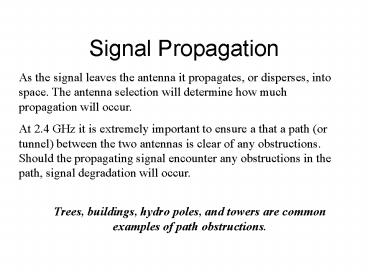Signal Propagation - PowerPoint PPT Presentation
1 / 9
Title:
Signal Propagation
Description:
The antenna selection will determine how much propagation will occur. ... When obstructions intrude on the first Fresnel Zone many issues can arise which ... – PowerPoint PPT presentation
Number of Views:864
Avg rating:5.0/5.0
Title: Signal Propagation
1
Signal Propagation
As the signal leaves the antenna it propagates,
or disperses, into space. The antenna selection
will determine how much propagation will
occur. At 2.4 GHz it is extremely important to
ensure a that a path (or tunnel) between the two
antennas is clear of any obstructions. Should
the propagating signal encounter any obstructions
in the path, signal degradation will occur.
Trees, buildings, hydro poles, and towers are
common examples of path obstructions.
2
The greatest amount of loss in your wireless
system will be from Free Space Propagation. The
Free Space Loss is predictable and given by the
formula
FSL(dB) 32.44 20Log f (MHz) 20Log d (Km)
The Free Space Loss at 1km using a 2.4 GHz system
is
FSL(dB) 32.44 20Log10(2400) 20Log10(1)
32.44 67.6 0 100.04 dB
3
Line of Sight
Attaining good Line of Sight (LOS) between the
sending and receiving antenna is essential in
both Point to Point and Point to Multipoint
installations. Generally there are two types of
LOS that are used discussed during installations
- Optical LOS - is related to the ability to see
one site from the other - Radio LOS related to the ability of the
receiver to see the transmitted signal
4
To quantify Radio Line of Sight, the Fresnel Zone
theory is applied. Think of the Fresnel Zone as
a football shaped tunnel between the two sites
which provides a path for the RF signals. At
WaveRider acceptable Radio Line of Sight means
that at least 60 of the first Fresnel Zone plus
3 meters is clear of any obstructions.
5
Fresnel Zones
Fresnel Zones
6
The First Fresnel Zone
Radius of n th Fresnel Zone given by
7
When obstructions intrude on the first Fresnel
Zone many issues can arise which will affect the
performance of the system. The main issues are
- 1. Reflection
- incident wave propagates away from smooth
scattering plane - multipath fading is when secondary waves arrive
out-of-phase with the incident wave causing
signal degradation
8
- 2. Refraction
- incident wave propagates through scattering
plane but at an angle - frequencies less than 10 GHz are not affected
by heavy rains, snow, pea-soup fog - at 2.4 GHz, attenuation is 0.01 dB/Km for
150mm/hr of rain
- 3. Diffraction
- incident wave passes around obstruction into
shadow regions
9
The Path Profile
Path Profile characteristics may change over
time, due to vegetation, building construction,
etc.
Path Profile characteristics may change over
time, due to vegetation, building construction,
etc.































